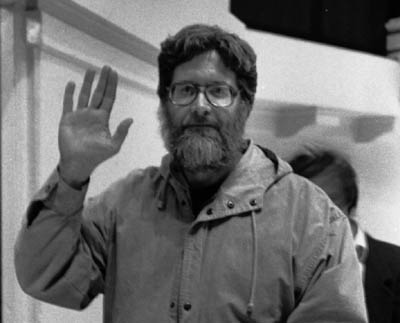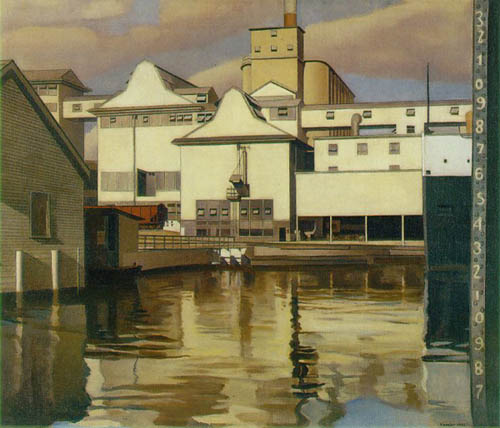N a p a l m
H e a l t h S p a
: R e p o r t 2 0 1 3 : S p e c i a l E d i t i o n
L o n g P
o e m M a s t e r p i e c e
s o f t h e P o s t b e a t s
DAVID
COPE

Photograph of David Cope by Allen Ginsberg, 1995.
River Rouge
after Charles Sheeler’s painting

Charles Sheeler, River Rouge Plant, 1932. Oil on canvas, 20 × 24 1/8 in. (50.8 ×
61.3 cm).
Whitney Museum of American Art, New York.
Faces in Shadow
toxic clouds roil & pass
above—
specks land
in
the unseen housewife’s
fluttering washlines,
in the nostrils of the workers—
here, the machine itself,
“functional
architecture”
half-distorted barns,
half featureless rectangles—
the river, reflecting this
ochre & brown
geometry,
the treeless land—
yet nowhere in this landscape do we see
the armies of workers marching
thru the doors at dawn,
chatter & coffee &
taking in
the
enveloping roar of the machines,
leviathan
eating them alive, the
mad labor of the assembly line,
the men
sweating, pulling, turning,
teasing out parts and
forms
forcing
out Ford’s cars
robotic in
dizzying
line, ears
gone deaf in the noise,
bosses above
counting down every movement,
measuring time,
measuring the men themselves to
see what more
they could squeeze
from
blood & bone.
Beyond the shadow
My dad grew up in the D,
his dad a mechanical
engineer
redesigning high speed
pipe turns at Con Ed,
his childhood neighborhood
raising
three to be trans-
national corporate officers—
by
day a wild flight of kids
jumping off roofs, racing
thru
back alleys—by night,
families cowering in basements
as Feds & the Purple
Gang
shot it out a block away.
he’d
dream back dancing
whole groups of friends
swinging at the Grande
to
the Duke & Goodman,
&
there was the
“Battle of the Overpass,”
where Ford’s goons
battered
Walter Reuther until
his skull bled, the
workers
“sticking to the union
‘til
the day they’d die”—
& as a young married man
he’d
lock my mother in
braving
machine guns
at
intersections to get
to his job working on
bell
housings of Sherman tanks
during
the race riots of
’43—Hitler
still rampant,
first islands pacific at last.
The Scythe of Time
My grandma died at Eloise
Asylum
now a phantom ruin—still
standing,
empty halls, paint peeling,
a fading stone in the cemetery.
I was born at Women’s Hospital
& saw Ted Williams hit one
into
the center field upper deck at
Briggs, Kaline hitless that
day.
Later Janis Joplin played the
Grande,
the Stones drove ‘em crazy at
Olympia—
Motown rose with muscle cars
on the Reuther, the riots of
’67—then
burned out years &
neighborhoods,
ruined homes & blocks, the
Rouge itself
become a relic of another time—
ghost world of shades chewed up
in the scythe, Time itself
become
a tale buried in the lost
villages
of Anishnabek & voyageurs
filled with the light of the
forest,
who fell in love with this
land of waters.
& I come back & dream
my grandfather
toiling in his garden, my dad a
boy
again, his dream of the D &
those men
who sang these streets &
turned
lathes & worked the lines,
hopeful.
["River Rouge" has
appeared in Big Scream 52, Big Hammer 16, and it is scheduled for print in The Wayne Literary Review. Used
by permission of the author.]
David Cope was born in Detroit on 13 January 1948, and grew
up on the banks of the Thornapple River in Western
Michigan. He studied under Robert Hayden at the University of Michigan, where
he mourned the deaths of childhood friends in Vietnam, became involved with the
anti-war movement, witnessed Allen Ginsberg's 1969 Moratorium Day reading at
Hill Auditorium and the massive police bludgeoning of demonstrators on the
night of the Chicago Seven conviction. In 1974, he founded Nada Press and Big Scream magazine, a homemade poetry
journal which has published over 200 poets and which Allen Ginsberg described
as his favorite small-press mag. His books of poetry are Quiet Lives (1983), On The
Bridge (1986), Fragment from the
Stars (1990), Coming Home (1993),
Silences for Love (1998), Turn the Wheel (2003), and Mask of Six Decades (2010). David’s
manuscripts, correspondence, and other papers are permanently archived at the
Special Collections Library at the University of Michigan. In 2011, Cope was
named to a three-year term as poet laureate of Grand Rapids, Michigan. In 2013, Poet Laureate Cope edited the historic first anthology of Grand Rapids poetry, Song of the Owashtanong: Grand Rapids Poetry in the 21st Century.